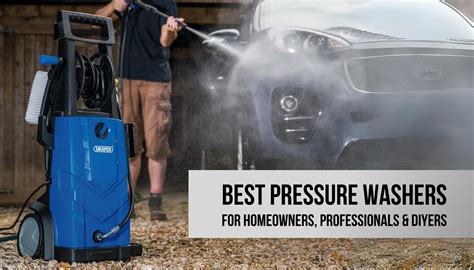As a homeowner, maintaining the exterior of your property can be a daunting task. Dirt, grime, and mildew can quickly build up on surfaces, making them look dull and worn out. One of the most effective ways to tackle this issue is by using a pressure washer. However, with so many different models and features available, it can be overwhelming to choose the right one for your needs.
In this article, we will delve into the world of pressure washer technology, exploring the benefits, types, and features that can help you make an informed decision. Whether you're a DIY enthusiast or a homeowner looking to keep your property looking its best, this guide will provide you with the knowledge you need to unlock the full potential of pressure washer technology.
Benefits of Pressure Washers

Pressure washers offer a multitude of benefits for homeowners. Here are just a few:
- Efficient cleaning: Pressure washers use high-pressure jets of water to blast away dirt, grime, and mildew, making quick work of even the toughest cleaning tasks.
- Cost-effective: Pressure washers can save you money in the long run by extending the life of your outdoor surfaces and reducing the need for harsh chemicals.
- Environmentally friendly: Many modern pressure washers are designed with eco-friendliness in mind, using less water and energy than traditional cleaning methods.
- Increased property value: A well-maintained exterior can significantly boost your property's value and curb appeal.
Types of Pressure Washers

When it comes to pressure washers, there are several types to choose from, each with its own unique features and benefits. Here are some of the most common types of pressure washers:
- Electric pressure washers: These are perfect for small to medium-sized cleaning tasks and are often more affordable than gas-powered models.
- Gas-powered pressure washers: These are ideal for larger cleaning tasks and offer more power than electric models.
- Cold water pressure washers: These are suitable for most cleaning tasks and are often less expensive than hot water models.
- Hot water pressure washers: These are perfect for heavy-duty cleaning tasks and can be more effective at removing grease and oil-based stains.
Key Features to Consider

When shopping for a pressure washer, there are several key features to consider. Here are some of the most important ones:
- Pressure output: Measured in pounds per square inch (PSI), this determines the strength of the water jet.
- Flow rate: Measured in gallons per minute (GPM), this determines the amount of water used.
- Nozzle type: Different nozzles can be used for different cleaning tasks, such as wide fan nozzles for large surfaces and narrow nozzles for tight spaces.
- Hose length: A longer hose can provide more flexibility and reach.
- Weight and portability: Consider a model that is lightweight and easy to maneuver.
Tips for Using a Pressure Washer

To get the most out of your pressure washer, follow these tips:
- Start with a wide fan nozzle: This will help you cover large areas quickly and efficiently.
- Use a low-pressure setting: Start with a low-pressure setting and gradually increase as needed.
- Keep the nozzle at least 12 inches away: This will help prevent damage to surfaces and ensure effective cleaning.
- Use a cleaning solution: Consider using a cleaning solution specifically designed for pressure washers to enhance cleaning power.
Common Mistakes to Avoid

When using a pressure washer, there are several common mistakes to avoid:
- Using too much pressure: This can damage surfaces and strip away paint or varnish.
- Using the wrong nozzle: Using a nozzle that is too narrow or too wide can reduce cleaning effectiveness and potentially damage surfaces.
- Not maintaining the pressure washer: Regular maintenance is essential to ensure the longevity and effectiveness of your pressure washer.
Pressure Washer Maintenance Tips

To keep your pressure washer in top condition, follow these maintenance tips:
- Regularly check and replace the nozzle: A clogged nozzle can reduce cleaning effectiveness and potentially damage the pressure washer.
- Check and maintain the hose: Regularly inspect the hose for signs of wear and tear, and replace it if necessary.
- Store the pressure washer properly: Store the pressure washer in a dry, protected area to prevent damage and extend its lifespan.
Conclusion
In conclusion, pressure washer technology offers a powerful and efficient way to maintain the exterior of your property. By understanding the benefits, types, and features of pressure washers, you can make an informed decision when choosing the right model for your needs. Remember to follow tips for using a pressure washer, avoid common mistakes, and maintain your pressure washer regularly to ensure effective and safe cleaning.
Gallery of Pressure Washer Images






FAQ Section
What is the best type of pressure washer for home use?
+The best type of pressure washer for home use depends on the size of the area you need to clean and the level of dirt and grime. Electric pressure washers are suitable for small to medium-sized areas, while gas-powered pressure washers are better for larger areas.
How often should I maintain my pressure washer?
+It's recommended to maintain your pressure washer regularly, ideally every 1-3 months, depending on usage. Check and replace the nozzle, inspect the hose, and store the pressure washer properly to ensure its longevity and effectiveness.
What are the common mistakes to avoid when using a pressure washer?
+Common mistakes to avoid when using a pressure washer include using too much pressure, using the wrong nozzle, and not maintaining the pressure washer regularly. These mistakes can damage surfaces, reduce cleaning effectiveness, and potentially harm the pressure washer.
